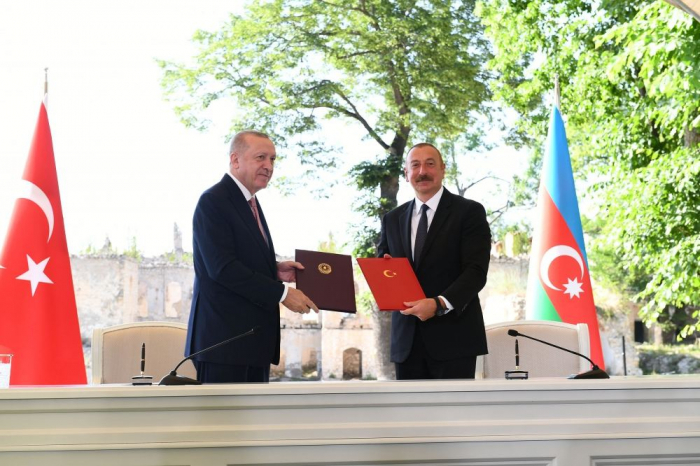By Fuad Shahbazov
On June 15, Turkey’s President Recep Tayyip Erdoğan paid an official visit to Karabakh to meet with his Azerbaijani counterpart, Ilham Aliyev, thus becoming the first foreign leader to visit the region following last year’s 44-day war. The meeting agenda included a trip to the city of Shusha, where the two leaders signed the “Shusha Declaration on Allied Relations Between the Republic of Azerbaijan and the Republic of Turkey.” The document is seen as a new bilateral roadmap entailing political and economic cooperation (including in energy, media, diaspora, trade, and other spheres) but particularly regarding defense and mutual military aid ( Trend News , June 16).
The location of the signing ceremony was not the only significant aspect of Shusha Declaration. In his speech during the event, President Aliyev emphasized the document’s reference to the Kars Agreement, signed a century earlier, which has significant symbolic meaning for both countries (TRT Azerbaijan, June 15). The still-binding treaty dates to 1921 and established the modern-day border between the three (then-Soviet) South Caucasus republics and the Republic of Turkey; moreover, Kars clarified the status of Azerbaijan’s Nakhchivan exclave (Report Agency, February 8). The explicit reference to the Treaty of Kars should not come as a surprise since, as a result of that document, the newly declared Republic of Turkey assumed responsibility as the guarantor of Nakhchivan in that period. A hundred years later, Azerbaijan signed another document with Turkey that effectively assigns the latter as the guarantor of Azerbaijani sovereignty over Shusha. The city of Shusha is considered a leading religious, historical and cultural center for Azerbaijanis; though it also holds similar, albeit contrasting, significance for Armenians (see EDM, November 12, 2020).
Of even greater strategic importance for Baku, the new document paves the way for deeper alignment between Azerbaijan and Turkey, a member of the North Atlantic Treaty Organization (NATO). Namely, the Shusha Declaration outlines joint efforts to reorganize and modernize the Azerbaijani Armed Forces, as well as compels joint action in the event of third-party aggression against the independence or sovereignty of either of the parties (Caspian News, June 16). Another important item that will contribute to closer bilateral military cooperation is the pledge to hold regular joint meetings of the two countries’ security councils (BBC—Azerbaijani service, June 15).
The Shusha document is likely to speed up the reforms in the Azerbaijani military that Aliyev announced in one of his wartime interviews last autumn. According to him, Azerbaijan seeks to modernize its Armed Forces specifically on the model of the Turkish Army (Ordu.az, October 5, 2020). President Aliyev’s statement can be seen as a signal for deeper engagement particularly in the defense-industry field. Recent achievements of the Turkish military-industrial sector, including its famed Bayraktar-TB2 combat drones, have attracted not only Azerbaijan but also Ukraine and NATO-members Poland (The New Arab, June 7), Latvia and the United Kingdom. In addition, since the end of the hostilities in the Karabakh region, the Azerbaijani Armed Forces (Special Forces, Navy and Air Force) have participated in several important joint military exercises in Turkey. On February 1–12, the two sides conducted large-scale winter drills in the eastern Turkish province of Kars (Caspian News, January 18). The next joint exercise, Anatolian Phoenix 2021, occurred on May 24 in Konya, Turkey, with the participation of the Azerbaijani air and naval forces. Furthermore, on June 3, in Baku, the two Turkic allies signed a declaration on “military study and training, as well as on the exchange of military personnel between Turkey and Azerbaijan and the acquisition of modern military technology by the latter” (Daily Sabah, June 3; Report.az, June 16).
Predictably, this strong emphasis on bilateral military cooperation and mutual aid, along with demonstrative actions to that effect in recent months, have reignited debates regarding plans for a future Turkish military base in Azerbaijan—and provoked an immediate reaction in Moscow. The Russian Ministry of Foreign Affairs issued a statement saying that “Moscow is closely monitoring developments around the potential Turkish military base in Azerbaijan, a move that could require Russia to take steps to ensure its own security and interests” (Reuters, June 18). Although the Shusha Declaration does not mention anything about a permanent foreign military facility on Azerbaijani soil (Turkish or otherwise), President Erdoğan notably stated that “the issue may become a subject of discussion” (Caucasian Knot, June 17).
As mentioned above, the new declaration also envisages deeper trade cooperation between Baku and Ankara via rebuilt or expanded regional transit routes, such as the “Zangazur corridor” (across Armenia’s southernmost Syunik province) linking the Azerbaijani mainland to the exclave of Nakhchivan and further on to Turkey. During their joint press conference in Shusha, both President Aliyev and President Erdoğan repeatedly reiterated the importance of establishing the corridor in the interests of all regional states, including Russia (Haqqin.az, June 17). Erdoğan also called on Armenia to join Turkey’s proposed six-partite regional cooperation format, which would additionally include Georgia, Azerbaijan, Russia and Iran (APA, June 15; see EDM, June 16).
From Azerbaijan’s perspective, the Shusha Declaration aims to foster relations with its natural ally Turkey, strengthen Baku’s geopolitical position regionally, as well as ensure additional security guarantees in the volatile South Caucasus. As for Turkey, the outcome of last year’s war in Karabakh has contributed to Ankara assuming the role of one of the main stakeholders in the new regional order. Indeed, Turkey’s growing footprint in the South Caucasus will enable it to more actively pursue a route eastward to the vitally important neighboring Central Asia, particularly to the energy-rich country of Turkmenistan—though these actions may raise concerns in Moscow and Tehran (see EDM, February 18, March 23, April 1). And finally, strengthened relations with Baku are enabling Turkish private- and state-owned companies to flood Azerbaijani, mostly in the Karabakh region, thus creating an important counterbalance to the Russian presence in this war-ravaged part of the world.
Publication: Eurasia Daily Monitor Volume: 18 Issue: 100
More about: #ShushaDeclaration
















































